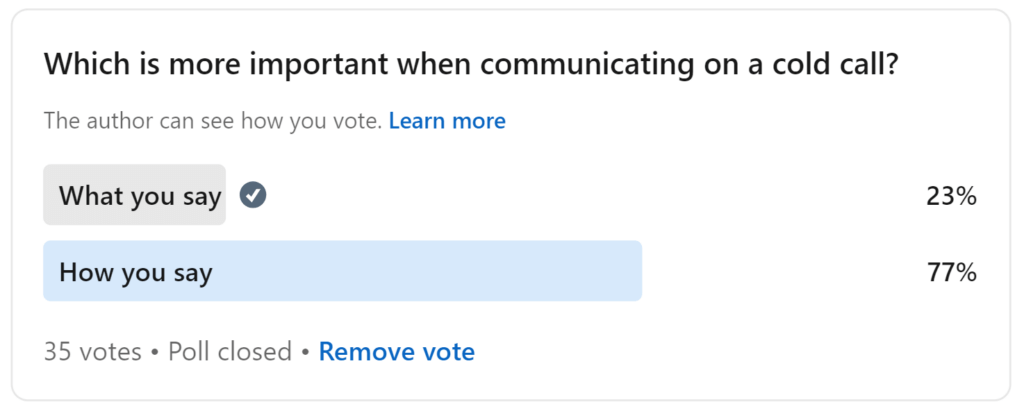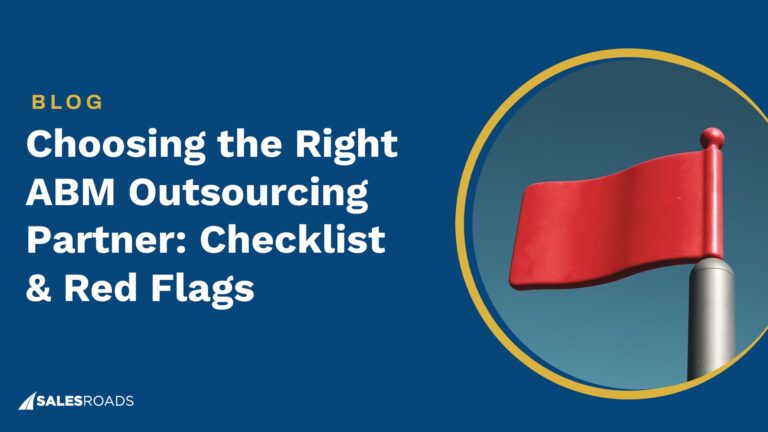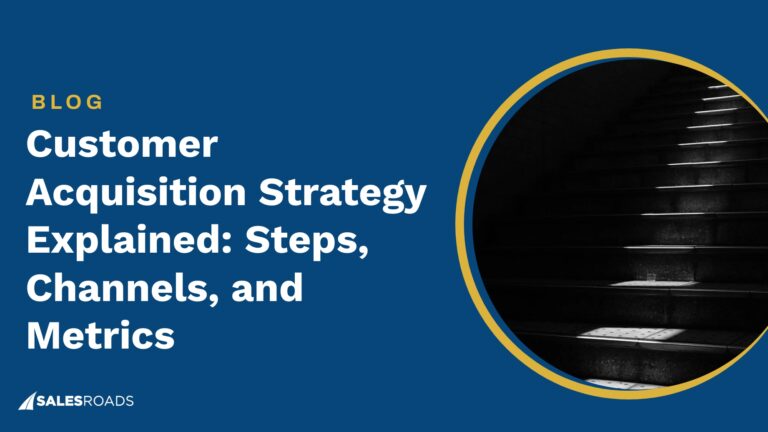Sales professionals aren’t gatekeepers of your products and services; they are pivotal architects of customer experience and value creation. However, this shift brings with it a critical challenge: the urgent need for continuous sales skill development.
The consequences of sales reps lacking in this area are far-reaching and can significantly impact the success of businesses in today’s competitive landscape. The commitment to continuous sales skill development is not just a pathway to success but a necessity for survival and growth.
Understanding the Need for Sales Skill Development
The need for sales skill development stems from several key factors. Technological advancements are constantly reshaping the way decision-makers interact with businesses and make purchasing decisions.
Sales professionals must stay abreast of these changes to effectively connect with and engage their ICP. This includes understanding new sales tools, digital platforms, and communication methods that can enhance customer interactions.
Customer expectations are also evolving. Today’s customers are more informed and have higher expectations. They seek personalized experiences and value-driven interactions. Sales professionals must develop skills that enable them to not only meet but exceed these expectations.
The competitive landscape in most industries is intensifying as well. Sales professionals need to continually refine and upgrade their skills to stay ahead. The market is dynamic, with ever-changing trends and customer expectations, making adaptability and continuous learning not just beneficial but essential for sales success.
Key Sales Skills Every Salesperson Should Develop
In B2B sales, certain skills are fundamental to achieving success. These skills form the backbone of every interaction, strategy, and decision in the sales process. From the initial contact with a potential client to the final handshake closing a deal, these skills are critical to navigating the sales journey effectively.
Let’s delve into some of these key skills that every salesperson should develop to excel in their field:
Communication and active listening
The ability to communicate effectively is paramount in sales. It’s not just about the words you say but also how you say them and, more importantly, how you listen.
Active listening involves fully engaging with the client and understanding the intent and emotion behind them. This skill allows sales professionals to pick up on subtle cues and respond appropriately, building a deeper connection with the client.
Effective communication and active listening create a two-way dialogue where information is not just transmitted but shared and understood. This involves practicing reflective listening, where you mirror back what the client has said, ensuring clarity and understanding.
Non-verbal cues also play a significant role and can often communicate more than words. The ‘what’ and ‘how’ of cold calling are inextricably linked.

In a poll we conducted on LinkedIn, 77% of respondents said how you deliver the message on the phone is way more important than the message itself.
Failure to do so can result in misunderstandings, missed opportunities, and a breakdown in rapport. In the worst-case scenario, you may even tarnish your brand’s image.
By improving these skills, sales professionals can build stronger rapport, gain trust, and create more meaningful and successful sales relationships.
Prospecting
Prospecting is the art of identifying and initiating contact with potential customers. It’s a critical step in the sales process, as it fills the pipeline with leads that can be nurtured into future sales.
Effective prospecting requires a strategic approach, which includes understanding the target market, setting clear objectives, and continuously refining methods based on feedback and results.
Persistence and resilience are key in prospecting, as it often involves navigating through a high volume of potential leads and facing rejection.
Sales professionals need to be adept at identifying high-quality leads and using a variety of techniques, from cold calling to social selling, to engage potential customers effectively. The goal is to convert prospects into leads that can be developed into sales opportunities.
Objection handling
Objection handling is a critical skill in the sales process. It involves addressing concerns or hesitations that a prospect may have about your product or service.
Effective objection handling is not about overcoming resistance with aggression but understanding the root of the objection and responding in a way that alleviates these concerns.
This skill requires careful listening, empathy, and the ability to provide clear, well-thought-out responses. Sales professionals should view objections as opportunities to further understand and address the client’s needs, thereby building a stronger relationship.
By effectively handling objections, salespeople can move the conversation forward and closer to a successful sale.
Segmentation and personalization
Segmentation involves dividing the customer base into distinct groups based on various criteria, such as demographics, behavior, or needs. This allows sales professionals to tailor their approach and offer solutions that are more relevant and appealing to each segment.
In today’s market, personalization is key to engaging customers. Personalization in sales leads to increased customer engagement, satisfaction, and loyalty. It involves using customer data to understand and anticipate needs, creating a more individualized experience.
Sales professionals must be skilled in analyzing customer data and using insights to guide their sales strategy. This personalized approach both improves customer relationships and enhances the effectiveness of sales efforts.
CRM and pipeline management
Effective pipeline management is crucial for maintaining a healthy flow of sales opportunities.
Customer Relationship Management (CRM) systems are invaluable tools for managing and analyzing interactions with prospects and customers. These systems help sales professionals organize customer information, track sales progress, and forecast future sales.
Using a CRM system effectively involves more than just inputting data; it requires strategic management of the information to maximize its utility. This includes segmenting customers, scheduling follow-ups, and analyzing sales data to identify trends and opportunities.
By leveraging the capabilities of CRM systems, sales professionals can improve their efficiency in managing sales activities and make more informed decisions that drive sales success.
For Sales Professionals: Best Programs, Courses, and Resources for Sales Skill Development
The journey to becoming a proficient sales professional is continuous and ever-evolving. To stay ahead in the competition, it’s crucial to engage in ongoing education and skill development.
Fortunately, there are numerous programs, courses, and resources available that cater to a wide range of sales skills and competencies. These educational avenues enhance knowledge and skills and also contribute significantly to career advancement.
A study by the RAIN Group underscores the value of robust sales development programs. It highlights that such programs are instrumental in producing highly motivated sales professionals who possess stronger skills and abilities.
When considering programs and courses for sales skill development, it’s important to look for those that offer practical, real-world applications along with theoretical knowledge.
Here are some types of programs and resources that sales professionals can explore:
Top-rated sales training programs & courses
There are numerous sales training programs and courses available, each designed to cater to different aspects of the sales process and professional development.
Let’s explore some of the top-rated programs and courses that have been highly recommended for sales professionals looking to elevate their skills:
Salesforce SDR professional certification (Free)
This certification, tailored for sales development representatives (SDRs) focusing on B2B products, is a comprehensive program emphasizing the importance of professional development in achieving success.
Over a six-month period, with an estimated commitment of five hours per week, participants delve into various aspects of the sales process.
Learning Outcomes:
- Understanding the roles and responsibilities of SDRs in the sales process
- Mastering strategies for effective prospecting
- Learning methodologies for conversational selling
- Techniques for cold calling and appointment setting
- Enhancing time management, objection handling, and personal branding skills
Dale Carnegie sales training ($1,595 – $2,595)
Dale Carnegie, a renowned name in the industry, offers a three-day intensive course focusing on building trust, credibility, and understanding the value of sales relationships.
This course is ideal for those looking to deepen their understanding of customer needs and how to position products and services as solutions.
Learning Outcomes:
- Developing sales strategies that foster long-lasting relationships
- Establishing meaningful connections with customers
- Techniques for minimizing negotiation time and improving sales outcomes
- Effective product pitches and placement strategies
Rain Group foundations of consultative selling ($450)
Offered by the Rain Group, this program introduces sales professionals to the tactics of successful selling. Available as a two-day in-person course or a six-week virtual program, it focuses on uncovering buyer needs and effectively pitching solutions.
Learning Outcomes:
- Building rapport with clients
- Presenting value propositions effectively
- Overcoming objections in sales conversations
- Developing skills in influence and persuasion
- Collaborative approaches in sales
Each of these programs offers unique insights and learning opportunities, catering to different aspects of sales skill development. Whether you are new to the field or an experienced sales professional, these courses provide valuable resources to enhance your skills, strategies, and overall sales effectiveness.
Essential books for sales professionals
For sales professionals eager to expand their knowledge and refine their skills, reading industry-relevant books is a highly effective strategy.
Books written by experienced sales experts offer a wealth of insights, from practical tips to motivational stories. They can serve as invaluable resources for both new and seasoned sales professionals.
Here are a couple of must-read books that come highly recommended in the field of sales:
Predictable Prospecting by Marylou Tyler and Jeremy Donovan
This book is often referred to as a “sales bible” for development managers and is an invaluable resource for anyone looking to improve their prospecting skills.
Co-authored by Marylou Tyler and Jeremy Donovan, “Predictable Prospecting” focuses on identifying high-value prospects and implementing account-based sales development strategies.
Key Insights:
- Techniques for identifying and targeting the most valuable prospects
- Strategies for initiating and maintaining conversations with potential clients
- Methods to enhance sales development metrics
- Utilizing sales metrics and forecasting to optimize the sales process
The book is packed with actionable tips on engaging and nurturing prospects into customers. It’s particularly beneficial for sales professionals who want to learn more about using data-driven approaches to refine their prospecting and sales processes.
Rejection Proof: How I Beat Fear and Became Invincible Through 100 Days of Rejection by Jia Jiang
“Rejection Proof” by Jia Jiang offers a unique and personal perspective on handling rejection, a common challenge in the sales industry. Jiang, a successful corporate professional, shares his journey of intentionally seeking rejection for 100 days, providing readers with insights into overcoming the fear of rejection.
Key Insights:
- Strategies for transforming objections into opportunities
- Learning to embrace and overcome failures
- Building confidence and resilience in the face of rejection
Jiang’s book is not only informative but also engaging, filled with humorous anecdotes and stories. It’s an excellent read for sales reps who want to build resilience, confidence, and a more positive approach to rejection and failure.
Podcasts for continuous sales learning
Podcasts have become a valuable resource for sales professionals looking to stay updated with the latest trends, gather insights from industry experts, and learn practical sales tips. They offer the convenience of learning on the go, making them perfect for busy sales reps who want to make the most of their time.
Here are some top-rated podcasts that are highly recommended for anyone in the sales field:
Make It Happen Mondays
Host: John Barrows
John Barrows, CEO and founder of JBarrows Sales Training, brings a wealth of knowledge and experience to his weekly podcast, “Make It Happen Mondays.”
The podcast features a diverse range of guests and covers a broad spectrum of B2B sales topics. From personal branding and career advice to the intricacies of daily selling, Barrows’ episodes are packed with practical sales tips and engaging anecdotes, many of which are drawn from his own experiences in the field.
The Win Rate
Host: Andy Paul
Join the sales conversation with Andy Paul on his dynamic podcast, “Win Rate.” As a celebrated author and sales strategist, Andy brings his rich expertise to each episode, exploring the nuances of B2B sales and the secrets to winning more deals.
Every week, “Win Rate” dives into the heart of sales success. Andy’s conversations with a diverse array of guests, from top sales professionals to industry thought leaders, are packed with actionable insights and real-world strategies. Whether discussing the latest sales technologies or the psychology behind successful selling, Andy’s guidance is both practical and transformative.
David Kreiger, President of SalesRoads, was a featured guest on Andy Paul’s episode titled “SDRs: A Thriving Future or a Relic of the Past?.” Listen to the conversation here.
Sales Gravy
Host: Jeb Blount
Jeb Blount, a noted author, speaker, and sales expert, offers a mix of quick-tip advice and in-depth discussions on his podcast, “Sales Gravy.”
The episodes vary in length, with some as short as 5-10 minutes, ideal for sales reps looking for quick insights on objections, negotiation strategies, and other related topics.
For Companies: Implementing a Sales Skill Development Plan
While individual sales representatives can certainly enhance their skills through various resources and courses, the responsibility for providing ongoing training and coaching for sales skill development predominantly falls on the organization.
Our whitepaper report on “The State of SDR Hiring and Talent Development” sheds light on a concerning trend: despite the clear benefits of regular coaching, over a quarter (26.9%) of sales representatives reported that they do not receive any coaching on a weekly basis. Additionally, 18.1% indicated that they resort to self-coaching. This gap highlights the urgent need for organizations to step up and provide structured, consistent training and development opportunities.
A well-implemented sales skill development plan is not only essential for fostering continuous growth and adaptability among sales professionals but also plays a pivotal role in talent retention.
The significance of these development plans is highlighted by LinkedIn’s 2023 Workplace Learning Report, which found that 94% of employees are more inclined to stay with companies that invest in their career development.
Implementing a sales skill development plan within an organization should involve the following steps:
Setting and achieving sales skill goals
Building a successful sales skill development plan begins with the organization acknowledging its responsibility to provide ongoing training and coaching. Such a commitment is reflected not just in words but through the allocation of resources, time, and effort toward developing a comprehensive sales training program.
The next phase involves identifying key areas for development. This step is crucial and should be approached as a collaborative effort. It involves assessing the current skill levels and performance of the sales team, incorporating feedback from the sales reps themselves, their managers, and analyzing performance data.
By pinpointing these areas, the development plan can be tailored to address specific needs and gaps, ensuring that the training is relevant and effective for each individual.
Once the key areas for development are identified, the next step is to set realistic timelines and goals. This involves establishing SMART goals that align with both the organization’s strategic objectives and the individual career aspirations of the sales representatives.
Setting clear, realistic timelines and goals ensures that the development plan is focused, achievable, and aligned with the overall growth strategy of the organization.
Executing your sales skill development plan
After setting the goals, the focus shifts to selecting appropriate training methods and resources. This selection should cater to the identified skills and goals and could range from in-house training sessions and external workshops to online courses and mentorship programs.
It’s important to choose methods that accommodate different learning styles and preferences, ensuring that all members of the sales team can benefit from the training.
Another key aspect is fostering a culture of continuous learning within the organization. This culture is nurtured by valuing and supporting ongoing education and skill enhancement. It can be achieved through regular training sessions, providing access to learning resources, and creating opportunities for knowledge sharing among team members.
Such an environment not only enhances the skill set of the sales team but also encourages a mindset of continuous improvement and adaptability.
Measuring and tracking progress
The final stages of implementing a sales skill development plan involve monitoring and adjusting the plan as necessary. Regularly reviewing the progress of the development plan is crucial. This should involve tracking improvements, soliciting feedback from the sales team, and being open to making necessary adjustments based on this feedback.
Such an approach ensures that the plan remains relevant and effective in addressing the evolving needs of the sales team and the market.
Lastly, it’s important to recognize and celebrate the progress and achievements of the sales team. Celebrating these milestones boosts morale and reinforces the importance of ongoing skill development.
Acknowledging achievements not only motivates the sales team but also highlights the organization’s commitment to recognizing and rewarding the effort put into professional growth and skill enhancement.
Bottom Line
The development of key skills such as communication, active listening, prospecting, objection handling, segmentation, personalization, and CRM management forms the core of a successful sales strategy.
However, a significant number of sales professionals lack regular coaching, with many resorting to self-coaching. This gap underscores the need for companies to actively invest in structured, consistent training and development programs.
The responsibility doesn’t rest solely on the shoulders of individual sales reps. Companies play a crucial role in facilitating this growth. The journey to sales excellence is a continuous one, requiring a balanced approach where both sales reps and their organizations commit to perpetual learning and improvement.










